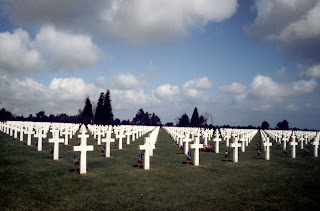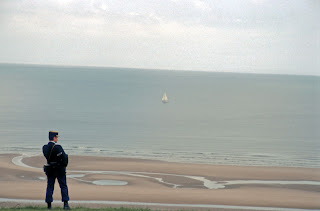 |
| Normandy American Cemetery on D-Day Plus 40 |
...from my introduction in Chappie World War II Diary of a Combat Chaplain
“I stood alone, awed by the sight of row after row of
simple white crosses spread across the grass-covered field. Each of the 9,386 graves
was marked with a pair of miniature French and American flags, all fluttering
in the breeze blowing off the English Channel. The sound of the surf gently
lapping the sand at the base of the cliff and the distant keening of sea gulls
barely intruded on the silence. What a contrast this must be, I thought, to the
mist-filled morning of June 6, 1944, when 133,000 American, British, and
Canadian troops charged these Normandy beaches.
Turning, I looked down to where a cluster of WW II
veterans stood at the water’s edge. What emotions were those survivors of that
long ago June 6 feeling?
 |
| French Soldier standing guard over Omaha Beach D-Day Plus 40 |
Among those veterans was my dad. A young man in his
thirties when the attack on Pearl Harbor thrust the nation into war, he left a
wife and two young children to answer God’s call to serve his country as a
chaplain.”
Anne Carpenter Eiland
My father had the habit of carrying a 9X6 loose-leaf notebook into which he jotted down sermon ideas and outlines as they came to him. When he joined the Army, he decided to dedicate one of these notebooks to the keeping of a diary.
As the war progressed, he began to realize that if he should be killed, this small book would reach his family and make it possible for them to share some of what his life had been like while away from them. Writing soon provided an outlet for expressing his own emotions - a vent for his frustrations and fears.
He
made entries before battles, in the midst of battles, and afterwards. He wrote
in his tent with the aid of a candle, by the light of dawn in my foxhole, or
riding along in his jeep as his driver, Dick Grace, drove. He wrote in ink, and
he wrote in pencil, recording the joys, the humor, and the tragedies.
My father’s story is an account of how he saw the events of battle as they occurred, not necessarily as historians may have later recorded them.
Anne Carpenter Eiland
My father had the habit of carrying a 9X6 loose-leaf notebook into which he jotted down sermon ideas and outlines as they came to him. When he joined the Army, he decided to dedicate one of these notebooks to the keeping of a diary.
As the war progressed, he began to realize that if he should be killed, this small book would reach his family and make it possible for them to share some of what his life had been like while away from them. Writing soon provided an outlet for expressing his own emotions - a vent for his frustrations and fears.
After
the war, he returned to civilian life and put the notebook away, determined to
put all the horror behind him. “I was both physically and emotionally drained,”
he explained. “I had seen so much destruction and lost so many dear friends. I
knew I would never forget, but I wanted to get back to my family and on with my
life.”
In
June of 1984, I traveled with my parents to France, where we participated in
the D-Day Plus 40 ceremonies being held in Normandy. It was during this trip -
the D-day events, the traveling with veterans retracing their path across
Western Europe, and visiting the American cemeteries along the way that I
learned of this journal. While I was convinced my dad’s diary should be shared, it
took me another seven years to convince him.
My father’s story is an account of how he saw the events of battle as they occurred, not necessarily as historians may have later recorded them.
...the facts, not the fiction
 |
| Captain Alton E. Carpenter |
volunteered to serve as a WWII chaplain. You will be invited to travel across the Atlantic with him and his combat engineers, sharing a journey of almost three years of front-line combat and discovering things about WWII in North Africa and Europe that you may not have known.
Your comments and questions will be welcome, and I am always interested in your stories or those accounts of friends and family members who served in WWII.
...once a teacher, always a teacher
Here’s your quiz for the day:
·
Omaha Beach was not the only beach the Allies landed on that day of 6 June 1944.
- Can you name the other four?
- What were the names of the ones upon which the US troops landed?
Not sure? Here is where you can check your answer.
